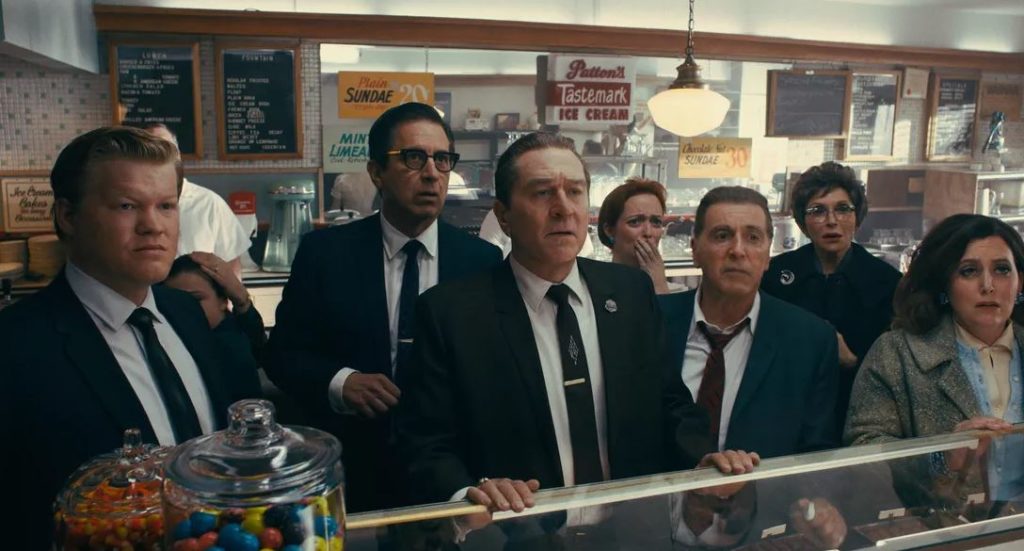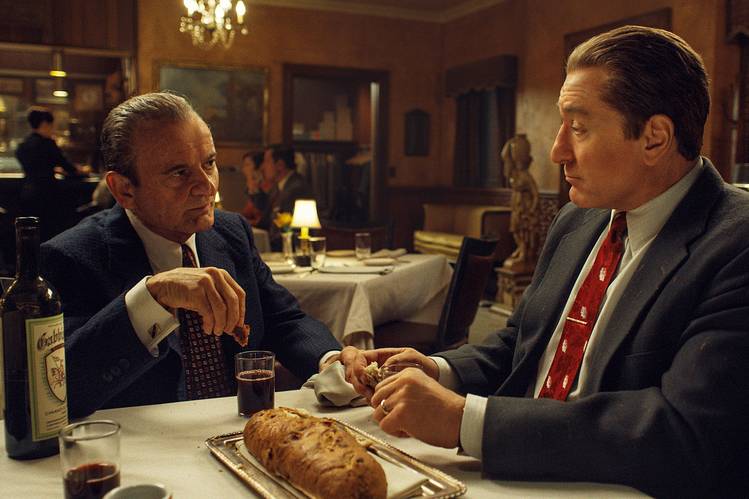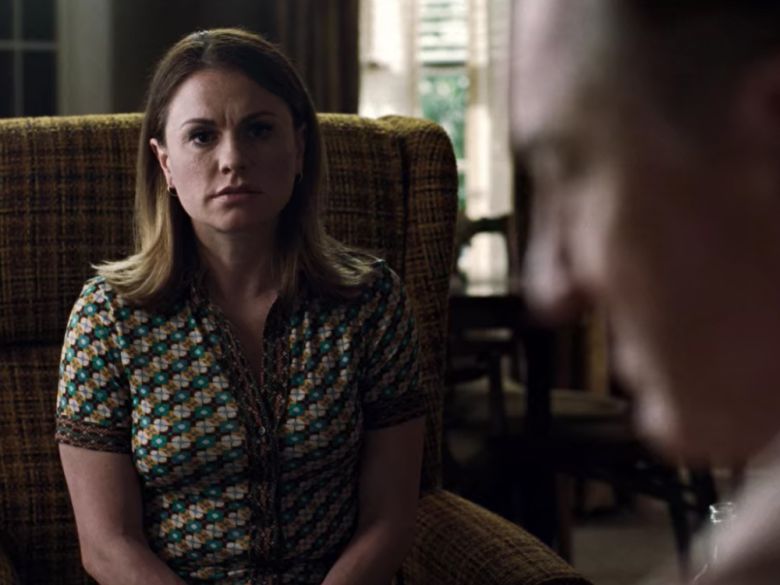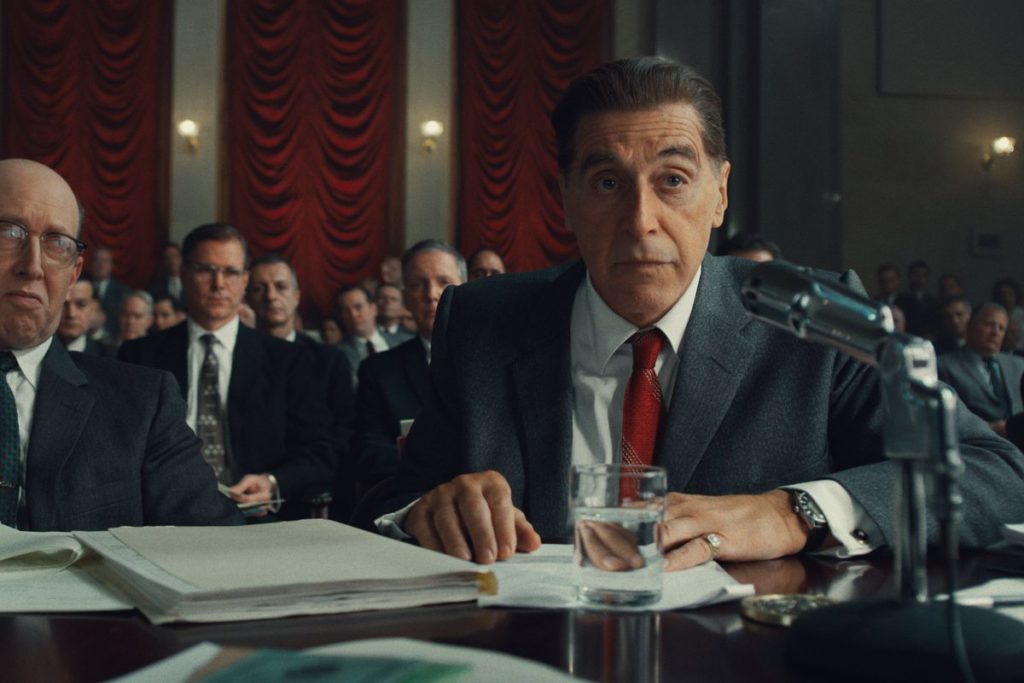
In one of the most memorable scenes in Goodfellas, Joe Pesci’s character triumphantly arrives for a celebration in his honor, only to realize that he’s just walked into his own death. It’s a devastating rug-pull that presages the film’s slow bend from buoyant mafioso hangout joint to brittle human tragedy. The Irishman, Martin Scorsese’s sweeping, lurching, ultimately moving new crime epic, is a bit like that scene writ large, but framed from a different perspective. It’s about the triggerman in that cold and empty room, and the paralyzing loneliness he suffers. Rather than focusing on the cathartic thrill of violence, this sprawling movie draws its power from aftermath—from what happens after the bullets leave the gun and the bodies hit the floor.
A solemn study of aging (and de-aging!), The Irishman announces itself as a monumental work, both in terms of its grand scope (Netflix’s tagline: “A lot can happen in a lifetime”) and its much-publicized 210-minute running time. Ambition is nothing new for Scorsese, and neither are gangsters. But while its bildungsroman arc and its fan-favorite cast inevitably recall Goodfellas and Casino, the director isn’t repeating himself here; instead, he’s reflecting. If anything, the mob movie that The Irishman most evokes is The Godfather Part II, given the way it refracts a career of savagery and crime through a prism of melancholy and loss.
This doesn’t mean that it’s quiet or staid. The Irishman may be about a tired old man wrestling with a lifetime of regret, but age has not deprived the 77-year-old Scorsese of any filmmaking energy. From its opening shot, which finds Rodrigo Prieto’s camera gliding down the hallway of a nursing home until it settles on the frail face of Frank Sheeran (Robert De Niro), the movie is vibrantly, hectically alive. Scorsese’s usual tics and tricks are all on display; the camera is constantly pushing in or pulling back, pop songs litter the soundtrack, and the protagonist continuously elucidates his criminal exploits through voiceover. It’s a rambunctious picture that attempts to shoulder the weight of its decades-spanning story through sheer cinematic verve.

It doesn’t always succeed. The Irishman is too forceful to be boring, but its vigor can also be sloppy and undisciplined. Many of Scorsese’s flourishes—the periodic slow-motion, the time-hopping structure, the splashes of text that inform us of a real-life figure’s eventual demise—feel haphazard, as though they’re random bells and whistles designed to prevent your attention from wandering. The film’s extravagant length is justifiable—the emotional potency of its final act wouldn’t be as crushing without its patient build-up—but that doesn’t mean every minute of its runtime is gripping. For its first two hours or so, the movie is entertaining but meandering, its constant digressions preventing its throughline from firmly locking into place.
That throughline is meant to be Frank’s professional rise and spiritual fall as a gangster in Philadelphia, where he works as a driver, an enforcer, a confidant, and a hit man; the last of these occupations is generally coded as a guy who paints houses. (Advertising his services to a potential client, Frank boasts, “I do my own carpentry too.”) It’s solid grist for a meaty character study, but Steven Zaillian’s screenplay, based on Charles Brandt’s biography of Sheeran, struggles to streamline Frank’s progression (and deterioration) into a coherent narrative. For such a long film, The Irishman feels weirdly rushed in spots. The details of a purportedly seminal murder are left frustratingly vague, while a conspirator’s participation in a different killing raises head-scratching questions. Frank’s home life is similarly blurry; we learn virtually nothing about either of his wives, and his four daughters likewise remain ill-defined.
Well, except for one. Frank’s third daughter, Peggy (played by Lucy Gallina as a child and Anna Paquin as an adult), gradually takes shape as a barometer of his morality, watchfully charting his slow descent into ethical purgatory. In a crucial early scene, the young Peggy accompanies her father to a grocery store, where he proceeds (rather unpersuasively) to beat the shit out of the owner. It’s one of many moments in The Irishman where the brutality feels ugly rather than rousing, as Scorsese throttles down the pop songs and makes you stew in the slowly accruing pools of blood. And while Paquin has very little dialogue, her silence speaks volumes; with an unsmiling mouth and a penetrating gaze, she becomes a reaper, damning Frank with the rectitude of her judgment.

The sadness of the Frank-Peggy relationship is one of the more poignant threads in a film whose primary fuel is character pairings. The juiciest of these is also the one that carries the biggest meta charge, because it affords the rare pleasure of seeing De Niro share the screen with one of his great acting contemporaries, Al Pacino. The latter plays Jimmy Hoffa, and if you’re wondering where his body is buried, you can be sure The Irishman suggests an answer. (The veracity of Brandt’s book, titled I Heard You Paint Houses, is heavily disputed; given the weight of the themes in play here, it’s also entirely irrelevant.) Naturally, Pacino has a terrific time in the role, adopting a howdy-doo Midwestern accent (similar to the one he deployed as Jack Kevorkian in You Don’t Know Jack) and swearing up a storm while highlighting the union boss’ feisty charisma. Despite its gravity, this movie is plenty fun in spots, never more so than when Hoffa is sparring with a capo nicknamed Tony Pro (played by the reliably excellent Stephen Graham); a scene where these two hotheads each demand the other’s apology is a riot of prideful bravado, even as it also recognizes something terrifying about the mob—that such dreadful power is wielded by men with such fragile egos. (Most of these man-babies are portrayed by very skilled actors; the knockout supporting cast includes Ray Romano, Bobby Cannavale, Domenick Lombardozzi, Jesse Plemons, Louis Cancelmi, and of course Harvey Keitel.)
All the same, the shameless bluster of Pacino’s performance doesn’t quite fit within The Irishman’s elegiac landscape; he’s a bull in an upscale Italian restaurant. That’s why the more affecting duo is a different long-awaited reunion: that between De Niro and Pesci, who plays Frank’s quiet but formidable boss, Russell Bufalino. Beyond Frank’s phantom interview in the nursing home (who’s he talking to? Us!), the film’s central framing device involves Frank, Russell, and their respective wives taking a leisurely drive from Philly to Detroit for a wedding. (The year is 1975; most of the narrative action takes place in the ’50s and ’60s via flashbacks, which is where the ballyhooed, mostly successful de-aging technology comes into play.)

It takes awhile before the significance of this sun-dappled road trip becomes clear, but in the meantime it’s a blessing just to hang out with these two actors, both of whom deliver wonderfully relaxed performances. Pesci in particular is splendid, conveying Russell’s absolute authority through even-tempered line readings. “It is what it is,” Russell tells Frank repeatedly, and that simple tautology gradually acquires devastating meaning: as a verdict, as a gospel, as an epitaph.
Martin Scorsese is hardly dead; in fact, he’s set to start shooting his next picture, Killers of the Flower Moon (with Leonardo DiCaprio), in March. Yet The Irishman nevertheless feels like a culmination, the capper to a career devoted to grappling with thorny themes—masculinity, guilt, greed, retribution—through the bruising force of his art. This sense of finality becomes especially acute in the film’s closing passages, when it soberly examines the lingering consequences of our terrible choices as we reach the end times. The Irishman is far from Scorsese’s best movie (though it’s certainly better than his last one); it is too slack, too imprecise. But in its concluding stretch—when it unleashes the power that it has been steadily accumulating—it becomes more than what it is.
Grade: B
Jeremy Beck is the editor-in-chief of MovieManifesto. He watches more movies and television than he probably should.
